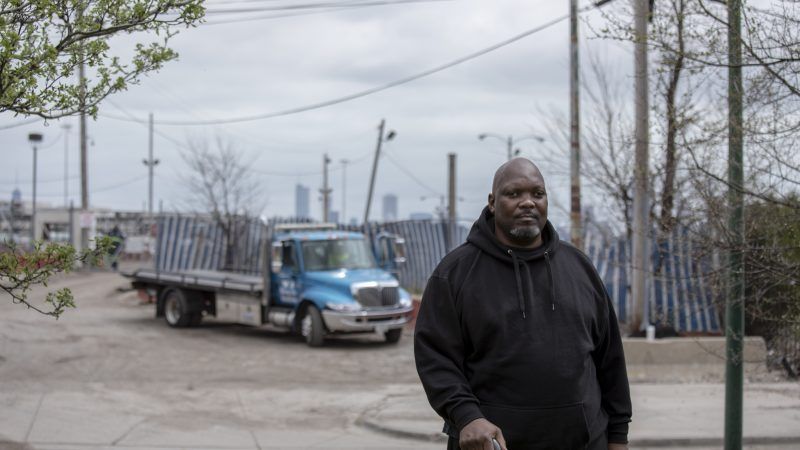The Man Who Fought Chicago for His Cadillac—and Never Got It Back
Spencer Byrd's case helped spark reforms and a federal lawsuit, but he died before seeing justice.

I first met Spencer Byrd in a Chicago diner one afternoon in 2018. Sitting across from me, he told me an outrageous story about how he'd been battling the city government for two years to get his 1996 Cadillac DeVille out of impound.
Byrd's story would help lead to reforms to Chicago's impound program and an ongoing federal class action lawsuit against the city. But despite fighting in court for nearly a decade, he never got his Cadillac back. I learned this week that Byrd died in February, while that lawsuit was still pending.
I've often considered it something—if not fate, then at least fortuitous—that Byrd and I connected.
In 2017, a staffer at the American Civil Liberties Union of Illinois told me about Chicago's punitive vehicle impound program and put me in touch with a local attorney doing pro bono work with people whose cars had been seized. The attorney gave me the phone numbers of five or six clients who he thought would be interested in talking to me.
Byrd was the only one who responded, and the story he told me was a doozy: He was a carpenter and a part-time auto mechanic in Harvey, Illinois. He said he was giving a client a lift in his car one evening in June 2016, when he was pulled over by Chicago police and searched. Byrd was clean, but his passenger, a man he says he'd never met before, had heroin in his pocket.
The police released Byrd without charging him with a crime, but his car was seized and dually claimed by both the Cook County State Attorney's Office and the city of Chicago. Essentially, his car was being claimed by two distinct layers of government. Even after a state judge declared Byrd innocent in the county's asset forfeiture case against his car, Chicago refused to release the vehicle until Byrd paid thousands of dollars in impound fines and fees under the city's municipal code, which didn't include a defense for innocent owners.
Byrd couldn't afford to pay the fines, and he'd never be able to without his car or the carpenter tools locked in the trunk. The car previously belonged to his late brother, and on some court forms, he listed it as a family heirloom.
"I can't understand it, because I'm almost to the point of being homeless," Byrd told me. "If I was found guilty or in the wrong, do what you gotta do, but I was blind to the fact."
Then at the diner, a small journalistic miracle occurred. Byrd slid over a large binder with every court filing and document in his case, even a letter from his local carpenter union vouching for him. He quite literally dropped the story in my lap. I took pictures of all of the documents, which allowed me to build a two-year timeline of Byrd's Kafkaesque battle with Cook County and the city of Chicago.
Thanks to Byrd's folder, the story I eventually wrote was one of the best of my career.
Other investigations by WBEZ, and ProPublica Illinois also showed how Chicago's massive impound program regularly ensnared innocent owners and low-income residents, soaking them in thousands of dollars of fines and storage fees, regardless of their ability to pay.
In 2019, Byrd became one of the lead plaintiffs in a civil rights lawsuit filed by the Institute for Justice, a public interest law firm, against Chicago. The suit alleged that the city's impound scheme violated the Illinois and U.S. Constitution's protections against excessive fines and unreasonable seizures, as well as due process protections.
Under pressure, Chicago partially reformed its vehicle impound program in 2020, including adding a defense for some innocent owners.
Not to discount the work of the many other plaintiffs, attorneys, and reporters who exposed Chicago's impound racket, but it occurs to me that part of this was all set in motion because Byrd fought for two years before I met him, with barely any resources, and refused to accept a farce where Chicago could take his car for a crime he'd been declared innocent of by a state judge.
Sometimes I imagined that one day Byrd would win his car back, and I'd fly to Chicago to take a picture of him reunited with his beloved Cadillac. That would have been a good story. I had professional self-interest in that of course, but Byrd also was also, as far as I could tell, a decent guy.
"I have no background in drugs, no felonies, no nothing, just been working hard all my life," Byrd told me at the diner. "I believe the city just wants you to throw money at them and not fight for what's right, and I'm fighting for what's right."
In March, a federal judge ruled in favor of Chicago and dismissed the Institute for Justice's lawsuit challenging the city's impound program. The Institute for Justice says it plans on appealing the decision.
"Chicago's impound program has violated residents' rights for far too long," Institute for Justice senior attorney Diana Simpson said in a press release. "Innocent owners should not face sky-high fines and fees for others' actions, and the city should not treat its car owners as a revenue source. We look forward to appealing this ruling and tackling head-on cases approving of this unconstitutional system."


Show Comments (15)